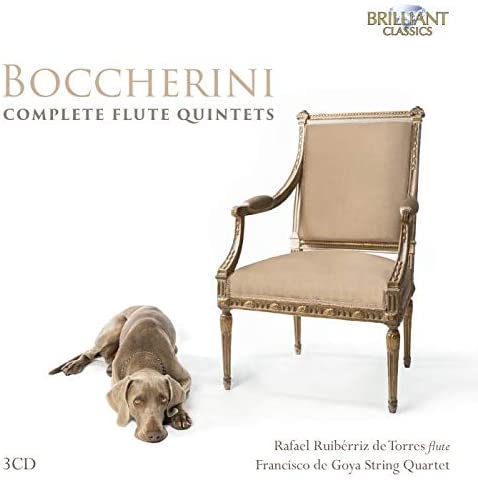Rafael Ruibérriz de Torres, Francisco de Goya String Quartet
158:29 (3 CDs)
Brilliant Classics 96074
Click HERE to buy this on amazon.co.uk
[These sponsored links help the site remain alive and FREE!]
Luigi Boccherini composed three sets of six flute quintets – namely his opera 17, 19 and 55 – the two earliest sets in 1773 and 1774, just after his appointment as chamber musician to Prince Luis Antonio de Bourbón in Spain. The two early sets, the product of a thirty-year-old composer, have a delightful freshness and individuality to them, with the flute playing the ensemble role of a primus inter pares rather than dominating the texture with virtuosity. The nevertheless demanding flute writing suggests the presence in the royal circle of a player of considerable technical and musical ability, but sadly he or she has not as yet been identified. Boccherini’s reputation (in my opinion undeserved) as a composer of slight and often superficial music is belied but this constantly imaginative and beautifully crafted music, which is played with enormous flair on period instruments by flautist Rafael Ruibérriz de Torres with the Francisco de Goya String Quartet. There is a wonderful sense of ensemble, as well as a witty and fruitful interaction among the players, bringing out the full charm and elegance of Boccherini’s music. Twenty-five years later, inspired by the flautist Gaspar Barli Boccherini returned to the flute quartet, composing his opus 55 set in 1797. What a lot has changed since the earlier sets! Boccherini has made the subtle but significant stylistic move from galant to classical, while he has fully embraced his adopted Spanish heritage, including no fewer than three fandangos in the set, as well as adopting a notably folk-related idiom elsewhere. He is also less coy about letting individual instruments, most notably the flute and his own cello, step out of the more homogenous textures into the spotlight. The result is music that sounds much more profound and rhetorically powerful, and the performers rise magnificently to the challenge with highly eloquent performances. Recorded in two dramatically contrasting venues (namely a church and a recording studio), the Brilliant engineers do a very fine job in creating the same lively and sympathetic acoustic for all three CDs, and the tone of the period strings and Signor de Torres’ Wenner copy of an 18th-century Grenser flute is captured extremely vividly. This is a delightful set of recordings, adding valuably to our impressions of Boccherini as a composer of imagination and substance.
D. James Ross
